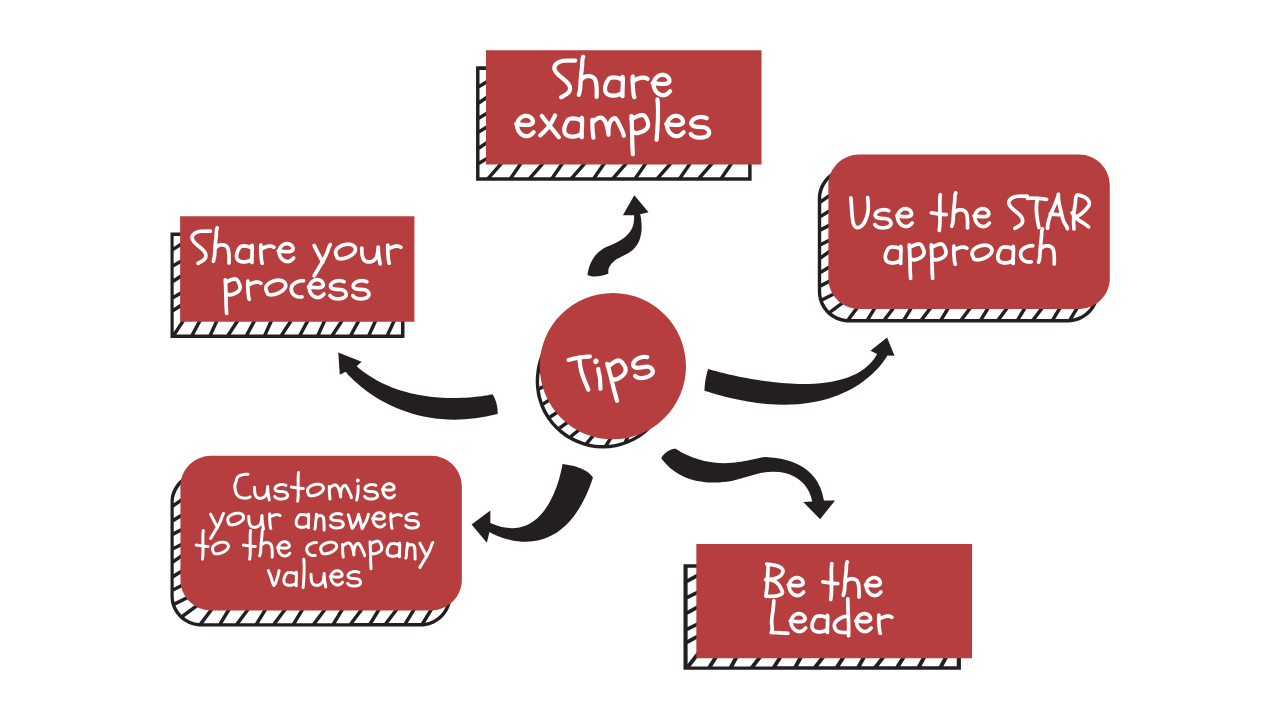Are you excited or nervous for your leadership interview? Feeling happy for the position, but a part of you is stressing over the interview? I understand. But with good preparation, you can calm your mind, shut down the negative voices and actually nail your leadership interview questions.
I’m sharing the 18 most common leadership interview questions and how to answer them, and a bonus of tips to help you ace your leadership interview.
18 leadership interview questions you should prepare
This section will list down the most common leadership interview questions and how to answer them. I have given alternative phrasing to some questions as well.

Self-awarness
1. What is your leadership style?
This is an important question that filters out the right candidates. The interviewer’s goal is to understand how you lead and whether your style suits your department and company values.
Answer with one or two leadership styles that align with your department and company’s values. For example, a tech firm that emphasises innovation will not encourage transactional or bureaucratic style; they need someone who can lead with transformational leadership.
2. What aspect of leadership do you struggle with? What do you find challenging about leadership?
This question assesses your self-awareness and your ability to communicate how you positively frame a negative situation.
Never say you didn’t struggle with any aspect. Explain the part you are improving or discuss the leadership skill you struggled with learning and implementing, but have now improved. Or you can also mention a specific scenario that you find challenging and is not relevant to your role in this company. Consider public speaking or managing creatives.
3. What leadership skills do you find most useful? What are the most important skills for a leader to have?
Your answer will tell the interviewer if you value and possess the same skills they need and value the most.
Customise your answer according to the company and the department. List out 3 to 4 skills and briefly explain why you think they are important.
For example, a marketing department requires the leader to foster creativity, collaboration, and strong feedback skills. A data leader should be a strategic thinker who can set systems and develop actionable tasks, and have strong problem-solving skills.
4. How do you lead by example?
Explain how you think leading with example is important to build trust and encourage the employees to do the same. Mention your time management, self-accountability and how you follow the same standards you expect from your team.
Team management
5. How do goals help you become a better leader?
This question is asked to evaluate your organisation and workflow management skills. Answer with how it gives you and the team a sense of direction and ensures your department is aligned with the company’s values and mission. You can mention how goals help you stay organised and ensure you track your progress.
6. What is your conflict management style? How do you handle a conflict?
Conflict management is a crucial leadership skill. If you’re asked a question like this, the interviewer wants to know how you resolve a disagreement between team members in a way that doesn’t leave resentments and ensures the members continue to work together as a team.
Answer with an example case if you have one, or briefly walk them through your conflict management approach. If you don’t know your conflict management style, check out this guide to learn about 5 conflict management styles and how to find yours.
7. How do you promote the professional development of your team? How do you train or mentor an employee?
Your coaching and mentorship skills are under evaluation here. You can answer with a story and share your tactics for training and mentorship. Find one thing in your process that’s different or impact creating that you can mention. It doesn’t have to be unique; it has to be effective.
8. How do you identify the strengths of your team members? How do you delegate tasks?
These are slightly different questions, but their responses go in the same direction. Answer with how you observe team performance to recognise their core skills during work, group meetings and one-on-one conversations. Briefly explain how it helps with effective delegation and increases the overall productivity of the department.
Communication
9. How do you deliver feedback?
Your answer should emphasise how you constructively offer feedback with empathy and respect. Continue explaining how you elaborate on what went wrong and provide actionable steps to improve.
10. How do you respond to feedback? How you handle criticism?
Your answer will show your emotional intelligence and attitude when receiving feedback or criticism. Set the ground by mentioning that you see feedback as an opportunity to grow. Explain how you decode feedback, reflect on it, communicate with your team and implement it.
11. How do you motivate a team member? How do you keep your team’s morale high?
Questions along these lines are about your interpersonal skills. Explain how you actively listen to their side of the story, empathise with them, adapt your style to their personality and offer support. Your response should include an element of empathy, celebrating their wins, reflecting on their achievements, and briefing them on its impact.
12. How do you create a vision?
This question evaluates how visionary you are and how you share that vision with others. Always consider the company’s mission and its goals. Frame your answer accordingly. Describe how you weave the company’s current direction with its vision and mission, and how you incorporate your department’s role in that mission.
13. How would you terminate an employee? Do you have experience terminating an employee?
The intent behind this question is to see your empathy, your approach to fairly handling a sensitive situation.
Start by acknowledging that it’s a sensitive matter and you take measures to ensure the employee can be retained through coaching, clear communication and expectations and one-on-one. Mention that you handle the process fairly with empathy, ensuring the person’s dignity and self-respect.
14. How do you motivate your team in a crisis? How do you encourage your team to achieve a challenging goal?
One of the leader’s main responsibilities is to keep their team’s morale high to ensure they perform their best, and that’s what these questions assess.
Explain your approach. It should include reflecting on past achievements and their challenges, recognising each member’s contributions, and slowly moving towards the current challenge. Explain how you break down the challenge, identify the core issue, and address it through a strategic roadmap.
Management
15. How do you keep projects on track?
Start your answer with how you break tasks into actionable milestones and assign them to the right people. You routinely check in on everything and ensure there are no road blocks or time constraints. You adjust the timelines if needed and work with your team to remove the roadblocks for a fast and efficient process. Wrap up with how you maintain accountability and celebrate the wins to encourage employees to stay on track.
16. How do you set goals? How do you set priorities?
Your time-management and resource allocation capabilities are under test with this question. Brief them about your approach, including how you identify the most important goals according to the company’s current direction, using the 80/20 rule to identify the top actions that drive the maximum results, and efficiently managing resources.
Adaptability
17. How do you ensure inclusivity? How do you manage language barriers within your team?
This question is all about empathy, understanding and your ability to bring every team member along. Explain how you add empathy and understanding to your leadership style, prefer clear communication and ensure they understand the tasks and processes. Continue adding how performance is irrelevant of language or background and you respect everyone’s culture and values.
Decision making and vision
18. What is your approach to making difficult or unpopular decisions?
This question checks your decisiveness. Start by explaining how you consider data and industry trends, weigh in your options and finalise the best route that aligns with company goals. Share how you communicate your decisions with your team through complete analysis and reasoning.
5 Leadership interview tips

1. Share examples
If you handled or assisted in a specific situation or your opinion made an impact, share that as an example when a relevant question comes up. Even if the question doesn’t ask for an example, you can smoothly plug it into your answer. This shows experience and builds trust.
2. Share your process
If you haven’t been a leader before, you will come across questions where you don’t have an example, even when the question asks for it. Instead of panic, reply with “I haven’t come across such a situation yet, but if I have to handle it, I would……” and explain your approach.
Sharing your process shows that even if you don’t have experience, you’re equipped with the right skills and tactics to handle any leadership challenge.
3. Use the STAR approach
The STAR approach is a simple and effective way to firmly articulate your answer (story). It’s specifically useful in leadership interviews where your communication skills are tested live through your answers.
The STAR approach stands for:
- Situation: Describe the context and background.
- Task: Explain the goal you had to accomplish.
- Action: Describe the steps you took to accomplish the task.
- Result: Wrap up with the outcome. Quantify it if possible.
4. Customise your answers to the company values
Thoroughly research the company and always connect your answer to the job requirements and the company’s values and mission. This approach expresses your attention to detail and positions you as a strong candidate.
5. Be the Leader
If you’re interviewing for a leadership role, you have to show that YOU ARE A LEADER. No matter how nervous you are, your actions, words and body language should exude confidence.
Final thoughts
In leadership interview questions, your goal is to show how you inspire, guide, and create space for others to succeed. Use the interview to show curiosity, empathy, and a strategic mindset. Think of it as a conversation and not a test. Walk in like a leader, with confidence and clarity. Don’t be afraid to pause and reflect before you answer.
Act as a leader.
Good luck.








